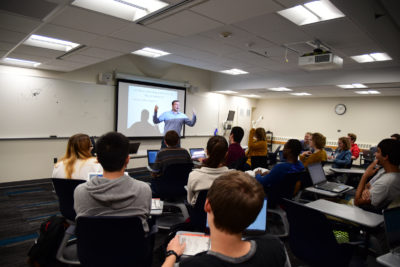
College students reported that their classes emphasize sharing their individual perspectives rather than learning about other cultures in the 2017 National Survey of Student Engagement — a trend that Boston University administrators are trying to combat in BU’s curricula.
Jillian Kinzie, associate director of the NSSE Institute, said three in five students who participated in the survey reported taking classes that “substantially emphasized sharing their own perspectives and experiences or respecting the expression of diverse ideas,” while only half reported taking classes that emphasized “learning about other cultures or discussing issues of equity or privilege.”
These results, which were released Thursday, come from the survey’s “Inclusiveness and Engagement with Diversity” module, an optional information set appended to the survey, which was implemented for the first time in 2017. There were 132 institutions across the country that elected to include this module, collecting data from 55,000 students, according to the report.
Kinzie said that although the fact that several schools chose to include this module is encouraging, there is still work to be done to improve classroom discussions of diversity.
“We’re falling short a little bit on the full spectrum of inclusive teaching practices,” Kinzie said.
Kinzie said the NSSE decided to add the module this year to further understand the impact of the increasing diversity that has taken place on college campuses worldwide.
“We need to make sure that we’re attending to the needs and issues that a more diverse student body brings to a college campus,” Kinzie said. “We need to make sure that we’re addressing real questions that plague our society and that students need to be able to address when they go out into the world of work or wherever they head next.”
Kinzie said it is important to monitor colleges’ engagement with diversity to ensure that no “views are getting suppressed.”
Allison BrckaLorenz, a NSSE data analyst who performed the analysis for the new module, said the results could provide new methods for universities to improve their programs by welcoming diversity.
“We just want to make sure that institutions are supporting all different kinds of students,” BrckaLorenz said, “and we hope that this can give them a little more concrete place to start if they’re wanting to improve classroom climate or larger institutional climate issues.”
Elizabeth Loizeaux, BU’s associate provost for Undergraduate Affairs, wrote in an email that BU’s commitment to diversity is reflected in its course offerings, especially the forthcoming university-wide general education program, BU Hub.
“BU Hub […] specifically addresses education around diversity, civic engagement and global citizenship, to which BU has been committed since its very founding as a university open to students of all genders, races and religions,” Loizeaux wrote.
Nazli Kibria, chair of BU’s sociology department, said she and other sociology professors incorporate diversity into their course curriculums as a natural part of the subject itself.
“Social inequality is really the heart of sociology, so if you’re talking about inequality, you also inevitably engage with diversity,” Kibria said.
The sociology professor also said that in order to encourage the sharing of diverse perspectives, professors must ensure that students feel comfortable and accepted when speaking about their own views.
“Classroom environments vary,” Kibria said, “but certainly I try to create an environment where different perspectives are respected and valued.”
Raul Fernandez, a lecturer in the School of Education, explained that he aims to facilitate direct discussions about racism, sexism, homophobia and other systems of oppression in his classes because students are coming from increasingly segregated backgrounds and may not have engaged in conversations about these topics in the past.
“We talk about tough issues by engaging in deliberative discourse, a process where we can disagree, but focus on seeking to understand one another’s perspective, not scoring debate points,” Fernandez wrote in an email.
Several BU students expressed mixed opinions on whether their classes emphasized expressions of diversity, but agreed that these discussions add to the classroom experience.
Megan Birgy, a senior in the College of Arts and Sciences, said she thinks her sociology classes could benefit from studying more diverse cultures.
“We study a lot of social constructs, structural phenomena in our society, and we very much tend to focus on American society and how social constructs are shaped here,” Birgy said. “We really don’t at all look at other societies and see what the parallels are or what the differences are.”
Deidra Higgins, a junior in the College of Fine Arts, said she thinks there is always room for improvement, but that CFA is doing a good job of encouraging diverse opinions so far.
“I think as is right now, there is a push to explore diversity in the CFA through our design and our work,” Higgins said.
Nehemiah Dureus, a junior in the College of Engineering, said he thinks students should be encouraged to share their own unique viewpoints to investigate complicated issues from all sides.
“Since there’s really no right answer to a lot of the problems that we have, talking about things, even arguing about things, is pretty healthy for trying to slosh together ideas to try to get to a common right path forward,” Dureus said.












































































































